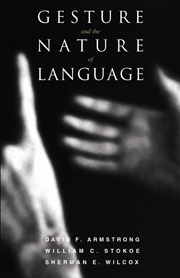Book contents
- Frontmatter
- Contents
- Acknowledgments
- Introduction: language from the body
- 1 The universe of gesture
- 2 The nature of gesture
- 3 Are signed and spoken languages differently organized?
- 4 Is language modular?
- 5 Do we have a genetically programmed drive to acquire language?
- 6 Language from the body politic
- 7 The origin of syntax: gesture as name and relation
- 8 Language from the body: an evolutionary perspective
- References
- Author index
- Subject index
8 - Language from the body: an evolutionary perspective
Published online by Cambridge University Press: 05 June 2012
- Frontmatter
- Contents
- Acknowledgments
- Introduction: language from the body
- 1 The universe of gesture
- 2 The nature of gesture
- 3 Are signed and spoken languages differently organized?
- 4 Is language modular?
- 5 Do we have a genetically programmed drive to acquire language?
- 6 Language from the body politic
- 7 The origin of syntax: gesture as name and relation
- 8 Language from the body: an evolutionary perspective
- References
- Author index
- Subject index
Summary
When we no longer look at an organic being as a savage looks at a ship, as at something wholly beyond his comprehension; when we regard every production of nature as one which has had a history; when we contemplate every complex structure and instinct as the summing up of many contrivances, each useful to the possessor, nearly in the same way as when we look at any great mechanical invention as the summing up of the labour, the experience, the reason, and even the blunders of numerous workmen; when we thus view each organic being, how far more interesting, I speak from experience, will the study of natural history become!
Charles Darwin, Origin of speciesIf “language” were substituted for “organic being” and “natural history” in the excerpt above, Darwin might be expressing the perspective on the origin and evolution of language which we have articulated in this book. We argue that language grows out of a complex of primary human adaptations, including bipedal locomotion, social living, reproduction without an estrous cycle, postnatal epigenesis, postreproductive longevity, and division of labor within the family. In addition, we argue that language grows out of more primitive primate and mammalian neuro-behavioral complexes, including those that govern face-to-face interaction, categorization, and symbolization. Finally, we argue that the key to the transition from primate vocal and visible gesture systems to language (that is, names organized into sentences) is the introduction of iconic, visible gestures at some point in hominid evolution.
- Type
- Chapter
- Information
- Gesture and the Nature of Language , pp. 198 - 236Publisher: Cambridge University PressPrint publication year: 1995



